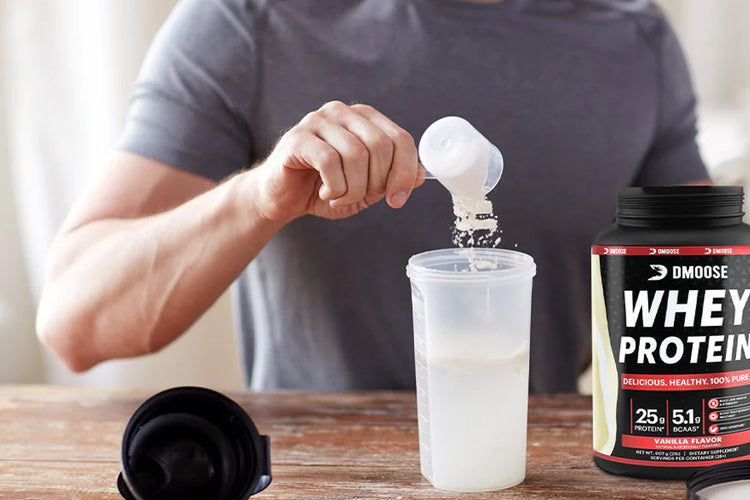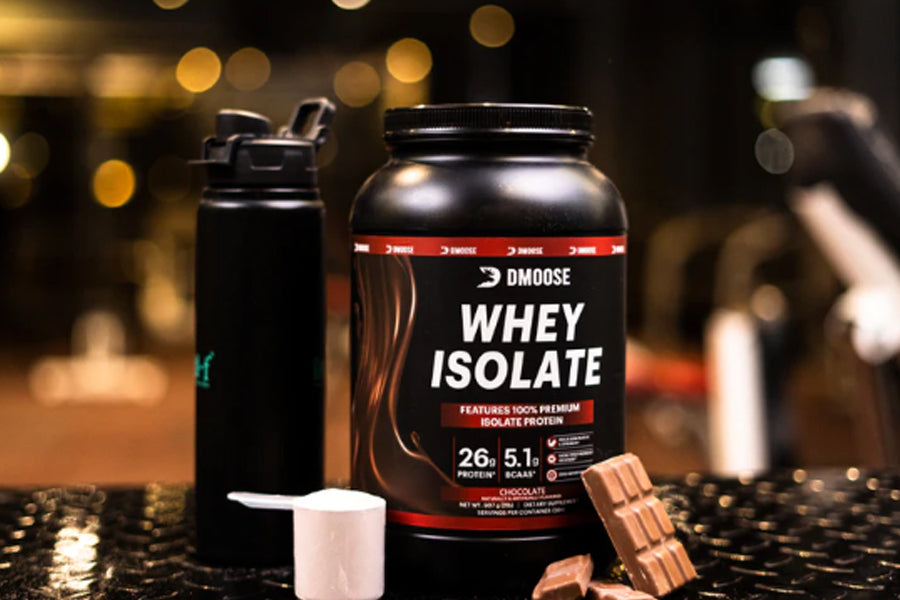Whey protein has become one of the most popular dietary supplements in the fitness industry, and for a good reason. As a high-quality protein source, it can aid muscle building and recovery, support weight loss, and provide various health benefits.
However, with so many types of whey protein supplements available and varying recommendations for daily intake, it can be time-consuming to determine the right amount for your individual goals.
If you're looking to optimize your results, it's essential to understand what whey protein is, its benefits, and the factors that can affect your daily needs. Doing so lets you determine the right amount of whey protein to take daily and ensure you get the most out of your supplementation.
In this article, we'll provide you with a simple guide on how much whey protein you should take per day based on your goals and address some potential side effects of consuming too much whey protein.
So whether you're looking to build muscle, lose weight, or simply improve your overall health, read on to learn more about the benefits of whey protein and how you can use it to achieve your goals.
What Is Whey Protein?
Whey protein is a protein source that is obtained from milk. It is a high-quality protein quickly and easily absorbed by the body. It is a popular supplement for athletes and people who want to enhance their muscle-building, weight loss, or overall health goals.
Whey protein is extracted during cheese making, where the protein is separated from the milk. Whey protein is considered a complete protein source as it contains all nine essential amino acids required for muscle maintenance, repair, and growth.
The amino acids in whey protein are essential for muscle growth, repair, maintenance, and supporting immune function and overall health. Whey protein is available in various forms, including powder, bars, and ready-to-drink beverages. It can be added to smoothies or consumed on its own.
Types of Whey Protein

There are three main types of whey protein: concentrate, isolate, and hydrolysate. Whey protein concentrate is the most common form of whey protein and is the least processed. It contains about 70-80% protein, along with some fat and lactose.
Whey protein isolate is more processed and contains at least 90% protein. Isolate is a good choice for individuals who are lactose intolerant, as it contains very little lactose. It is also lower in fat and carbohydrates than concentrate.
Hydrolysate is a pre-digested form of whey protein that is rapidly absorbed by the body. It is ideal for individuals who need a quick source of protein, such as after a workout. Hydrolysate is more expensive than concentrate or isolate, but it is highly effective for muscle building and repair.
The type of whey protein you choose will depend on your dietary needs and fitness goals. The concentrate is an excellent all-around option for most people, while isolate is a good choice for lactose intolerant people who want to minimize their fat and carbohydrate intake.
Hydrolysate is the most expensive option but is highly effective for muscle growth and repair. In the next section, we'll delve into the benefits of whey protein and how it can support your health and fitness goals.
Benefits of Whey Protein

Whey protein has many benefits, making it a popular supplement for athletes, bodybuilders, and fitness enthusiasts. Here are some of the key benefits of whey protein:
- Muscle Building and Recovery: Whey protein is well-known for its ability to support muscle building and recovery. Its high amino acid content, particularly BCAAs, and leucine, makes it an effective tool for promoting muscle protein synthesis and reducing muscle breakdown. Whey protein supplementation can improve strength and increase muscle mass in novice and experienced athletes.
- Weight Loss and Management: Whey protein can be an effective weight loss and management tool. Its high protein content can increase feelings of fullness and help reduce appetite leading to reduced calorie intake and weight loss. Additionally, whey protein can support the preservation of lean muscle mass during weight loss, essential for maintaining a healthy metabolism.
- Improved Nutrient Absorption: Whey protein can also help improve nutrient absorption. For example, taking whey protein with a meal can increase the absorption of amino acids, promoting muscle protein synthesis.
- Convenience: Whey protein supplements are also convenient and easy to use. They can be easily added to smoothies, shakes, or meals for an extra protein boost.
In summary, whey protein offers a range of benefits that can support muscle building and recovery, weight loss and management, and overall health.
Related Article: The Science of Muscle Recovery: How Much Rest Between Workouts for Muscle Growth?
How Much Whey Protein Should I Take Per Day?

Whey protein is a popular dietary supplement that many people use for various reasons, including weight loss, building muscle, and improving overall health. But how much whey protein should you take per day? The answer depends on several factors, including weight, activity level, and fitness goals.
The Recommended Daily Allowance (RDA) for protein is a minimum of 0.36 grams per pound of body weight.
However, this is only the bare minimum needed to meet basic nutritional needs and avoid deficiency; getting at least 30% of your daily calories from protein is recommended for those looking to lose weight or build muscle.
Whey Protein Dosage for Weight Loss
If your goal is weight loss, whey protein can help you achieve that. It has been shown to boost metabolism, curb appetite, and reduce the urge to snack and overeat, resulting in fat loss.
You don't need to take a lot of whey protein to see the benefits. For moderate activity levels, 10-20 grams of protein (or 1/2-1 scoop of whey protein powder) per day should suffice.
For those with high activity levels, 20-40 grams of protein (or 1-2 scoops of whey protein powder) is recommended to keep hunger at bay and promote a healthy metabolism.
Whey Protein Dosage for Building Muscle
To gain muscle, consuming whey protein can help you achieve that. Whey protein has all nine essential amino acids required for building and repairing muscle tissue. Moreover, the body quickly absorbs whey protein more than any other protein, which increases muscle protein synthesis.
For moderate activity levels, 20-25 grams of whey protein powder (or 1 level scoop to 1 heaping scoop) post-workout should give you the protein boost you need to build lean muscle.
For those with high activity levels, athletes may need up to 0.9 grams of protein per pound of body weight. Taking 24-48 grams of whey protein powder (or 1-2 heaping scoops) post-workout can help you reach your protein goals and maximize muscle gain and repair.
In conclusion, the amount of whey protein you should take daily depends on your body weight, activity level, and fitness goals. It's recommended to get at least 30% of your daily calories from protein, and for weight loss or muscle building, the recommended whey protein dosage ranges from 10-40 grams per day.
Related Article: How Many Grams Is in a Scoop of Protein Powder?
Possible Side Effects of Consuming Too Much Whey Protein
While whey protein has many potential benefits, it's essential to be mindful of the possible side effects of consuming too much. Overconsumption of whey protein can lead to digestive issues, such as bloating, gas, cramping, and diarrhea.
These symptoms are usually mild and can be managed by reducing the amount of whey protein consumed or spreading the intake throughout the day.
In rare cases, excessive whey protein can also lead to more severe side effects. High doses of whey protein can increase the workload on the kidneys and liver, leading to long-term damage. This is especially true for individuals with pre-existing kidney or liver conditions.
Additionally, excessive protein intake can lead to dehydration, so drinking plenty of water when consuming whey protein is essential.
It's important to note that the recommended daily allowance for protein is based on the average person's needs and may vary based on an individual's age, sex, weight, and physical activity level. Therefore, it's best to consult a healthcare professional to determine the appropriate amount of whey protein for your specific needs.
In conclusion, while whey protein can be an effective supplement for achieving fitness goals, consuming it in moderation and in line with your body's needs is essential.
Choosing the Right Whey Protein Supplement
When it comes to choosing the right whey protein supplement, there are several factors to consider. Here are some tips for selecting a high-quality, safe, and effective whey protein supplement:
- Type: There are three types of whey protein: concentrate, isolate, and hydrolysate. Whey protein concentrate is less processed and has a lower protein content, while whey protein isolate is more processed and has a higher protein content. Hydrolysate is pre-digested and absorbed more quickly by the body. The type of whey protein you choose will depend on your dietary needs and fitness goals.
- Brand: Many brands of whey protein supplements are on the market, so it's crucial to choose a reputable brand that uses high-quality ingredients. Look for well-known brands in the fitness industry that have a good reputation for producing safe and effective supplements.
- Ingredients: You must choose a whey protein supplement free from harmful additives like artificial sweeteners, flavors, and colors. Look for supplements made with high-quality ingredients, such as grass-fed whey protein, natural flavors, and natural sweeteners like stevia and monk fruit.
- Nutritional Information: When choosing a whey protein supplement, you must check the nutritional information, including the protein content, calories, and serving size. Look for supplements that have a high protein content and low-calorie count. The protein content should be at least 20 grams per serving, and the calorie count should be no more than 150 calories per serving.
- Price: The price of a whey protein supplement can vary widely. Look for reasonably priced supplements compared to other high-quality whey protein supplements on the market. Remember that the cheapest option may not always be the best quality, so it's important to balance price with quality.
- Taste: Whey protein supplements come in a variety of flavors, so it's crucial to choose a flavor that you enjoy. Look for supplements with natural flavors and sweeteners for a better taste experience.
DMoose whey protein is a high-quality supplement that meets all the above criteria. DMoose offers both Whey Protein Concentrate and Whey Protein Isolate, so you can choose the type that best suits your dietary needs and fitness goals.
DMoose Whey Protein is made with high-quality ingredients, including grass-fed whey protein, natural flavors, and natural sweeteners like stevia and monk fruit. It has a high protein and low-calorie count, making it an excellent choice for muscle-building and weight loss.
Moreover, DMoose Whey Protein is reasonably priced compared to other high-quality whey protein supplements on the market, and it comes in delicious flavors.
The Bottom Line
Whey protein is a great supplement to help you meet your fitness goals. Knowing how much whey protein you should take daily is essential based on your fitness goals, body weight, and physical activity level.
This article has provided a simple guide to help you determine the appropriate daily amount of whey protein for your needs. Additionally, it has outlined essential factors to consider when choosing a whey protein supplement, such as the type, brand, ingredients, nutritional information, price, and taste.
Considering these factors, you can make an informed choice and select a whey protein supplement that suits your dietary requirements and fitness objectives.
With the right whey protein supplement and proper nutrition, you can achieve your fitness goals and improve your overall health and well-being.














